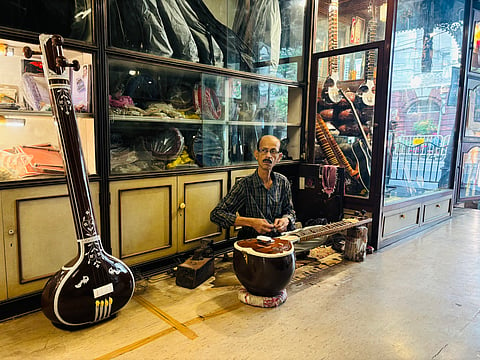
- LIFESTYLE
- FASHION
- FOOD
- ENTERTAINMENT
- EVENTS
- CULTURE
- VIDEOS
- WEB STORIES
- GALLERIES
- GADGETS
- CAR & BIKE
- SOCIETY
- TRAVEL
- NORTH EAST
- INDULGE CONNECT

In the heart of Kolkata, where time lingers and melodies whisper through dusty strings, a few instrument shops remain as guardians of an art that refuse to fade. Tucked away in narrow lanes and old neighbourhoods, these shops feel like they belong to another time. These are not the flashy stores with neon signs and sleek interiors that you find in malls. Instead, they are quiet—almost hidden—where the sound of a sitar being tuned or a harmonium being tested, greets you before you step in. The air carries a faint smell of varnish and wood, blending with the city’s timeless charm. The shelves are lined up with instruments—some polished to perfection, others showing their age.
Long before music was bought with just a click online, legends like Pandit Ravi Shankar and Nikhil Banerjee would find themselves drawn towards these unassuming doorways of Kolkata’s iconic instrument shops, where craftsmanship sang louder than commerce. For decades, these shops were more than just commercial establishments, they were sanctuaries for musicians, connoisseurs, and students alike, where the craftsmanship was as revered as the music itself. But with the rise of modern, upscale music stores and online marketplaces, the demand for hand-crafted instruments is dwindling. Yet, these shops continue to survive, not by competing with the big players, but by staying true to their roots. They remain spaces where tradition and passion outweigh commercial success—a rarity in a world that is increasingly fast-paced and business-driven. In a city where change is both constant and contested, how does century-old music shops keep their tune alive amidst the crescendo of modernity?
If you walk from BBD Bagh crossing towards Lalbazar, cross it and take a left turn, you would find a host of small, unpretentious instrument shops on your right, including the popular harmonium maker BCM Music Palace or the 275-year-old J Mondal & Co. “People can buy Western instruments more at the modern shops or online, but if someone wants to buy a harmonium or tabla, they have to come to this area. And I see there’s good demand for harmonium now, compared to other Indian instruments. Maybe, there are more people taking an interest in singing than learning to play the instruments,” says Tapas Mondal, a third-generation owner of BCM Music Palace. There is a huge demand for ukuleles and guitars from specific brands, as well as violins, he shares, but what is really hampering their business is the increased frequency of online shopping. “There is no alternative to buying in person, especially when it comes to things like musical instruments. People end up buying online, without even knowing what they are investing in,” he adds.
We also met the septuagenarian Ashok Sardar, the present owner at Monoj Kumar Sardar & Bros, who specialises in making and repairing Indian classical instruments, especially stringed ones like Sitar, Sarod, Esraj and the likes. He feels, more than anything else, only a handful of people are indulging in playing or learning Indian musical instruments, which as a result, is affecting their business. And he doesn’t blame the current generation, he rather says, the system is to be blamed. “The kids go through such a maddening rush, that there is no time left to practice artforms with the kind of mental peace, or time that the artform demands,” says Ashok.
Ashok is the third-generation owner, running this almost 100-year-old establishment, and shares with us that his next generation probably wouldn’t join the business. “This is a lot of work. We are both the manufacturers and the salesmen. There is no apparent charm to the shop, along with this additional downfall of the whole industry,” he adds. What he points out and we found really interesting is that it is not about business. One just can’t sell the instruments, one needs to learn the nuances of the craft to sell it, and also customise it when needed, which makes it extremely difficult to give away the shop to someone new.
Not just this area, there are two more in South Kolkata, The Melody and Hemen & Co., both of which have been on Rashbehari Avenue for decades. While the spokesperson at The Melody wasn’t ready to talk much about the negative impact on their business, Tapan Sen, current co-owner of Hemen & Co. shared, “We don’t treat this like a business, so we don’t promote it too much. We have loyal customers, and we are happy with that. We are a niche shop, and we know it. It keeps us going.”